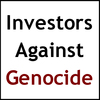Congress Considers New Disclosure for Investments Tied to Genocide
Investors Against Genocide recommends rules to enable Americans to avoid such connections
Published 12-02-10
Submitted by Investors Against Genocide
Research has shown that American investors are overwhelmingly opposed to having their hard-earned savings tied to genocide. Nonetheless, because most individual investors entrust their savings to mutual funds, millions of Americans are investing, unknowingly, inadvertently, and against their will, in companies funding genocide.
On Tuesday, November 30, the House Financial Services Subcommittee on International Monetary Policy and Trade held a hearing, Investments Tied to Genocide: Sudan Divestment and Beyond, which explored the progress made by the Sudan Accountability and Divestment Act (SADA) as well as how Congress can better empower capital markets to contribute to making a positive change in the case of genocide.
Eric Cohen, Chairperson of Investors Against Genocide (IAG), testified at the hearing and proposed transparency and disclosure rules to empower investors to choose to avoid connections to the most egregious human rights abuses. "Financial institutions should be more transparent and provide customers with the material information needed to avoid investing in companies complicit in genocide. By acting, Congress will help investors avoid connections, whether in Sudan or in future crises, to the worst human rights abuses -- genocide and crimes against humanity," said Cohen.
Members of Congress from both parties who attended the hearing stated that more needs to be done to ensure that American investments do not support genocide.
"SADA represented a major milestone for those who want to ensure their investments do not fund genocide or mass atrocities," said Congressman Mike Capuano (D-MA). "We say 'never again' but we must take the necessary actions to ensure that our investments aren't inadvertently financing criminal behavior -- and this includes making it easier for investors to divest in cases of extreme violence or crisis. I will continue to work with my colleagues to ensure that Congress can have a constructive role in helping to prevent American investments in countries committing such atrocities," he said.
Congressman Gary G. Miller (R -CA), Ranking Member of the Subcommittee, also expressed a desire for further action. "The people of Sudan have long suffered through civil war and economic hardship, and the current policies of their government have led to widespread human rights abuses and genocide in the Darfur region. I hope our panel's discussion will expand efforts on behalf of American businesses to effect change in the war torn region," said Congressman Miller.
Congressman Gregory W. Meeks (D-NY), Chairman of the Subcommittee, stated, "This hearing was extremely important in addressing the humanitarian crisis in Darfur and in bringing together key representatives to present effective means to achieve a positive change in this crisis."
"Yesterday's hearing was incredibly important," said Congressman Jim McGovern (D-MA). "We must continue to focus on how Congress can concretely encourage investment firms, banks, and public and private institutions to offer their investors a portfolio that is free from pumping money into genocidal regimes."
In his testimony on behalf of Investors Against Genocide, Cohen emphasized that mutual funds should have an extra level of due diligence and disclosure regarding investments tied to genocide and crimes against humanity if and when the U.S. has imposed sanctions related to human rights abuses that restrict American companies.
Other witnesses at the hearing included Thomas Melito, Director, International Affairs & Trade, U.S. Government Accountability Office; Adam M. Kanzer, Esq., Managing Director & General Counsel, Domini Social Investments LLC; and Richard S. Williamson, Former Special Envoy to Sudan.
In December 2007, Congress unanimously passed the Sudan Accountability and Divestment Act (SADA) following a surge in public support for targeted divestment from Sudan due to the genocide and crimes against humanity committed in Darfur.
Investors Against Genocide is a citizen-led initiative, dedicated to convincing mutual funds and other investment firms to make an ongoing commitment to genocide-free investing. Investors Against Genocide works with individuals, organizations, financial institutions, the press, and government agencies to build awareness and create financial, public relations, and regulatory pressure for investment firms to change their investing strategy to avoid investments in companies which substantially contribute to genocide or crimes against humanity. Investors Against Genocide is staffed by volunteers and is a project of the Massachusetts Coalition to Save Darfur Inc., a 501(c)(3) non-profit charitable organization, incorporated in the state of Massachusetts. For more information, visit www.investorsagainstgenocide.org.

Investors Against Genocide
Investors Against Genocide
Investors Against Genocide is a non-profit organization dedicated to convincing mutual fund and other investment firms to change their investing strategy so as to avoid complicity in genocide. In particular, we want investment firms to avoid or divest holdings of PetroChina (Chinese), Sinopec (Chinese), ONGC (Indian), and Petronas (Malaysian), the four major oil companies that are partnering with the Government of Sudan and helping to fund the genocide in Darfur. The campaign works with individuals, companies, organizations, financial institutions, the press, investment firm employees, and government agencies to build awareness and to create financial, public relations, and regulatory pressure for investment firms to change. The ultimate goals are that investment firms adopt at least the most basic ethical investment policies, that the Government of Sudan ends its deadly genocide in Darfur, and investment firms avoid investing in genocide in the future.
More from Investors Against Genocide

